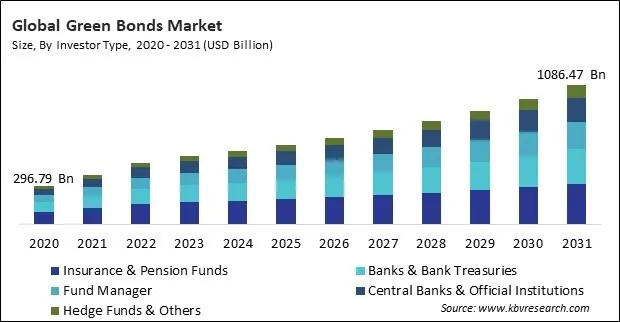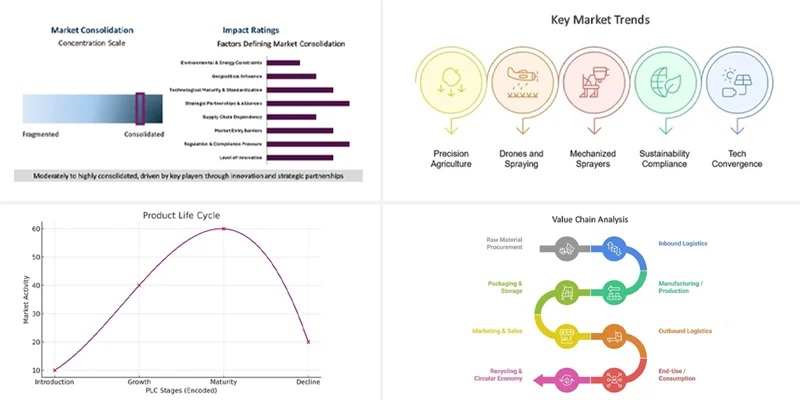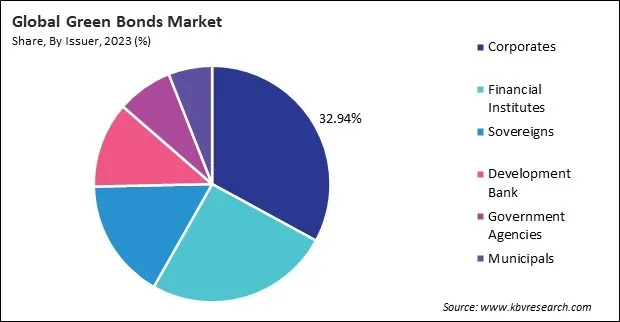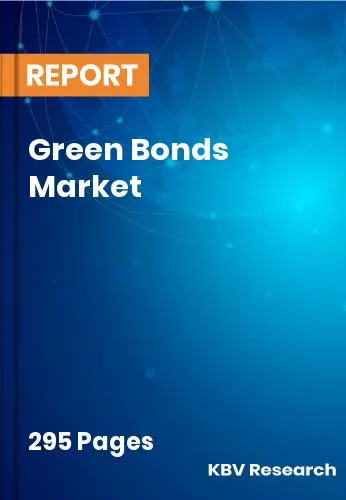“Global Green Bonds Market to reach a market value of USD 1086.47 Billion by 2031 growing at a CAGR of 9.6%”
The Global Green Bonds Market size is expected to reach $1086.47 billion by 2031, rising at a market growth of 9.6% CAGR during the forecast period.
The Europe segment witnessed 41% revenue share in the market in 2023. The region has been at the forefront of sustainable finance, with strong regulatory frameworks such as the EU Green Bond Standard, the European Green Deal, and the Taxonomy Regulation. European governments and financial institutions have actively issued green bonds to fund renewable energy projects, carbon-neutral infrastructure, and climate adaptation initiatives.

Growing awareness of climate change and environmental sustainability in recent years has fueled the explosive growth of green investments. Governments, corporations, and financial institutions worldwide recognize the urgent need to mitigate carbon emissions, combat global warming, and transition toward a low-carbon economy. Hence, this growing climate-conscious approach shapes financial markets and drives long-term economic resilience and environmental stewardship.
Additionally, Institutional and retail investors increasingly focus on sustainable finance and impact investing, prioritizing companies and projects that align with sustainability and ethical governance. Pension, mutual, and sovereign wealth funds are pivotal in integrating these bonds into their portfolios. Norway’s Sovereign Wealth Fund, one of the world's largest investors, has significantly increased its ESG investments, including green bonds that support climate action and sustainable development. These bonds will, therefore, continue to play a crucial part in the worldwide shift to a low-carbon and sustainable economy, as seen by the growing investor interest in ESG investments.
However, unlike traditional financial instruments, these bonds require issuers to demonstrate a clear environmental benefit. However, due to the absence of universally accepted guidelines, different issuers and countries often follow varying criteria to classify a bond as green. This lack of uniformity creates ambiguity in the market and opens the door for greenwashing, where companies falsely or misleadingly claim their projects contribute to sustainability. Hence, the lack of standardization and transparency is hampering the expansion of the market.


On the basis of issuer, the market is divided into government agencies, sovereigns, financial institutes, corporates, municipals, and development banks. The financial institutes segment witnessed 25% revenue share in the market in 2023. Banks and other financial entities have played a pivotal role in underwriting and issuing green bonds, facilitating the flow of capital into sustainable projects. Many financial institutions are integrating climate risk assessment into their lending and investment portfolios, increasing their participation in the green bonds market.

Based on investor type, the market is classified into bank & bank treasuries, hedge funds, fund manager, insurance & pension funds, and central banks & official institutions. The bank and bank treasuries segment procured 24% revenue share in the market in 2023. Bank treasuries' involvement in the green bonds market is fueled by their commitment to sustainable banking practices and portfolio diversification. Commercial and investment banks invest in green bonds as part of their risk management strategies, ensuring compliance with climate-related financial regulations and green banking initiatives.
By application, the market is segmented into energy, building, water, transport, waste, land, and others. The transport segment recorded 20% revenue share in the market in 2023. Governments and corporations have issued green bonds to finance electric vehicle (EV) infrastructure, high-speed rail projects, metro expansions, and sustainable aviation initiatives. The push toward reducing greenhouse gas emissions from the transportation sector, combined with policy incentives for public transit and EV adoption, has accelerated the deployment of green bonds in this space.
Free Valuable Insights: Global Green Bonds Market size to reach USD 1086.47 Billion by 2031
Region-wise, the market is analyzed across North America, Europe, Asia Pacific, and LAMEA. The Asia Pacific segment garnered 29% revenue share in the market in 2023. Countries like China, Japan, India, and Australia have significantly ramped up their green bond issuances to support renewable energy, sustainable urban development, and low-carbon transportation. China, in particular, remains one of the largest green bond issuers globally, with strong backing from state-owned banks and corporate entities.
| Report Attribute | Details |
|---|---|
| Market size value in 2023 | USD 531.69 Billion |
| Market size forecast in 2031 | USD 1086.47 Billion |
| Base Year | 2023 |
| Historical Period | 2020 to 2022 |
| Forecast Period | 2024 to 2031 |
| Revenue Growth Rate | CAGR of 9.6% from 2024 to 2031 |
| Number of Pages | 295 |
| Number of Tables | 440 |
| Report coverage | Market Trends, Revenue Estimation and Forecast, Segmentation Analysis, Regional and Country Breakdown, Porter’s 5 Forces Analysis, Company Profiling, Companies Strategic Developments, SWOT Analysis, Winning Imperatives |
| Segments covered | Issuer, Investor Type, Application, Region |
| Country scope |
|
| Companies Included | Deutsche Bank AG, Morgan Stanley & Co. LLC, JPMorgan Chase & Co., Equinix, Inc., Engie SA, Citigroup Inc., Abu Dhabi Future Energy Company, HSBC Holdings plc, The Bank of America Corporation, and Barclays PLC |
By Issuer
By Investor Type
By Application
By Geography
This Market size is expected to reach $1086.47 billion by 2031.
Rising Climate Awareness & Sustainability Initiatives are driving the Market in coming years, however, Lack of Standardization and Transparency restraints the growth of the Market.
Deutsche Bank AG, Morgan Stanley & Co. LLC, JPMorgan Chase & Co., Equinix, Inc., Engie SA, Citigroup Inc., Abu Dhabi Future Energy Company, HSBC Holdings plc, The Bank of America Corporation, and Barclays PLC
The expected CAGR of this Market is 9.6% from 2023 to 2031.
The Insurance & Pension Funds segment led the maximum revenue in the Market by Investor Type in 2023, thereby, achieving a market value of $319.1 billion by 2031.
The Europe region dominated the Market by Region in 2023, thereby, achieving a market value of $433.8 billion by 2031.
Our team of dedicated experts can provide you with attractive expansion opportunities for your business.

 Drivers
Drivers
 Restraints
Restraints
 Opportunities
Opportunities
 Challenges
Challenges
